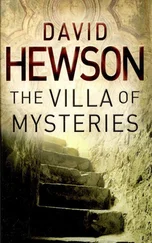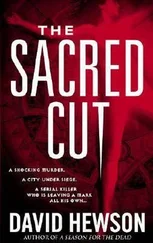As someone down at the Questura doubtless knew, Peroni thought.
“Father,” he said, and saw from the look on the man’s face that he had somehow picked the wrong word, “it’s important we talk to Randazzo.”
“We have a warrant .” Zecchini brandished a piece of paper.
The monk stared at the document. “A warrant? What’s that?”
“It’s a piece of paper that says you’ll damn well bring him to us whether you like it or not!” Zecchini yelled.
The curses he added rang around the bright, sunlit cloister, sending a flutter of doves scattering for the cloudless sky.
But nothing dented the monk’s composure. He simply folded his arms and kept on smiling, silent. Peroni couldn’t stop himself from casting a sour glance at the Carabinieri major.
“We don’t want to search a monastery,” he told the monk calmly. “And I’m sure you don’t want that either. There would be so many officers. So much disruption. And noise.”
The monk didn’t like noise. Peroni had watched the way his nose wrinkled when the volume of Zecchini’s voice rose.
“No one wants noise,” the big cop added, craftily.
The monk laughed, and Gianni Peroni was surprised to realise the man was laughing at them. And that there was precious little between a smile and sneer on his face.
“He’s not here. They went out for lunch. And no . . .”—the answer came before the question—“I don’t know where and I don’t care. This is a small and quiet community, gentlemen. When we’re asked to help the city, we do so, without asking questions. We trust our betters. Do you?”
Zecchini scowled at him, then asked, “Gone for good?”
The monk’s arms opened, the hands raised in a gesture of futility. “We’re neither a prison nor a hotel. I can help you no more. I can . . .”
Gianni Peroni couldn’t take his eyes off the doves. They’d assembled again around the foot of the statue of Saint Francis. It was a great place to hide a man. So good it seemed odd Randazzo felt moved to leave it, if only for a meal.
Then, as he watched, the birds began to lift again, a whirling fury of grey and white feathers, rising, racing in every direction, mindless, terrified.
Four, maybe five, shots rang out from somewhere beyond the monastery’s quiet walls, bounced off its bright, clean terra-cotta and echoed around the small, perfect square, threading their way through the colonnades.
Luca Zecchini had his gun in his hand in an instant. The monk gaped at the weapon, both shocked and angered by its visible presence.
“Where?” Zecchini yelled.
Gianni Peroni wasn’t going to wait for this little charade to play itself out. Bawling out some scared, unworldly monk who’d never heard a gunshot in his small, protected life wasn’t going to find them Gianfranco Randazzo. Peroni marched his big frame back into the outside world, thought about what he knew of this area, and where a police commissario with a taste for good food might want to eat. There weren’t many options. Then he began to run, aware, after just a few long strides, of Zecchini and his men playing catch-up in his wake.

TERESA LUPO HAD TOLD PINO FERRANTE SO MUCH about the patient whose life he’d saved that long night she dragged him from his dinner table in Bologna. She’d told him how Leo Falcone was a man worth preserving, a fine, honest, conscientious ispettore in the Rome police, someone who deserved better than to be butchered by some naive Venetian surgical hack, even if they could find one.
Now Falcone lay back on his bed, eyes wide open, blazing at each of them in turn, spitting fury in all directions. Pino glanced at her and smiled, that self-deprecating smile she’d known from their college days, the one that couldn’t offend a soul but still managed to say, Really?
Even Raffaella Arcangelo seemed a little taken aback. Clearly this was one side of Leo she’d never witnessed.
Pino let Falcone exhaust himself with one final set of demands—all the latest case notes on Aldo Bracci and the Arcangelo case, what new forensic there was, and a recall of Costa and Peroni, from wherever they happened to be malingering, presumably to give the inspector someone new to yell at—then sat down by the bed, folded his arms, and peered at the prone man there.
“Inspector Falcone,” he said mildly. “You’ve been seriously wounded by a gunshot to the head. You have been unconscious now for more than a week. I would have hoped a man who has been through what you have would have asked me one or two questions about his condition. Otherwise . . .”
The surgeon now had a rather hard smile, it seemed to Teresa, one he’d learned since college.
“Perhaps I will be driven to the conclusion that you are not so sufficiently recovered as you seem to believe.”
Falcone, propped up on a couple of pillows, bandages round his scalp, face lacking that full tan she’d come to take for granted, was silent for a moment.
Then, with all his customary bullishness, he replied, “I am a police officer in the middle of a murder investigation. It’s my duty to be kept fully informed. It’s your duty not to get in my way. I would advise you to remember that.”
Pino waited. When it became clear Falcone didn’t intend to utter another word, the surgeon said, “Would you like to ask me anything now? Or would you like me to leave and allow you to continue bellowing at your colleagues until your strength runs out? Not that I think you have much energy left for that. The choice is yours.” He looked at his watch. “I would like to be home in Bologna by eight, so please make your decision this instant.”
Falcone glanced at Teresa and Raffaella Arcangelo, as if they were somehow a part of this. Then, in a subdued tone, he asked, “What the hell’s wrong with me?”
“You were shot through the head,” Pino replied with a shrug. “There was damage to the brain. It’s a sensitive organ, even in an insensitive man. A mysterious organ too. I can go through the details later but they won’t tell you much. To be honest, they don’t tell me that much either. This is the way things are with neurological matters. What I see now is what I’d expected. Hoped for, to be honest with you. There is some paralysis below the waist. You should also expect to experience headaches. Blackouts maybe. And some side effects from the medication for sure. We will need to monitor all these things for a while.”
A purple blush of outrage began to suffuse Falcone’s face. “I have to work!”
“That’s ridiculous.” Pino said it bluntly. “A man in your condition cannot work. Even if you were physically capable, your mental state is still fragile, however much you wish to believe otherwise. You need what any other man or woman needs in such circumstances. Convalescence. Constant care. Regular follow-ups. You will be reliant on others for some time. I trust you can teach your ego to accommodate this fact, Ispettore. ”
“I . . .” The words died in Falcone’s mouth. This was a situation he had clearly never encountered before.
“Leo,” Teresa interjected. “You’re no more or less human than the rest of us. Plus, you’re lucky to be alive. Just take it easy. And then . . .” She glanced at the surgeon, who had once again looked at his watch. “Oh, for God’s sake, Pino . . . Since he won’t ask, I will. How long will he be like this? What does it mean?”
“It means a wheelchair. For at least two, three months. Possibly longer. It is simply a matter of waiting now. I have no crystal ball. It is possible . . .” He stared at Falcone to make sure this went home. “ . . . if you’re unlucky, that you will be in a wheelchair forever. I don’t think this is irreversible, but one can never be sure. You will need regular physiotherapy to work on that leg. I gather you are a bachelor. Perhaps there is a police home that could look after you.”
Читать дальше













